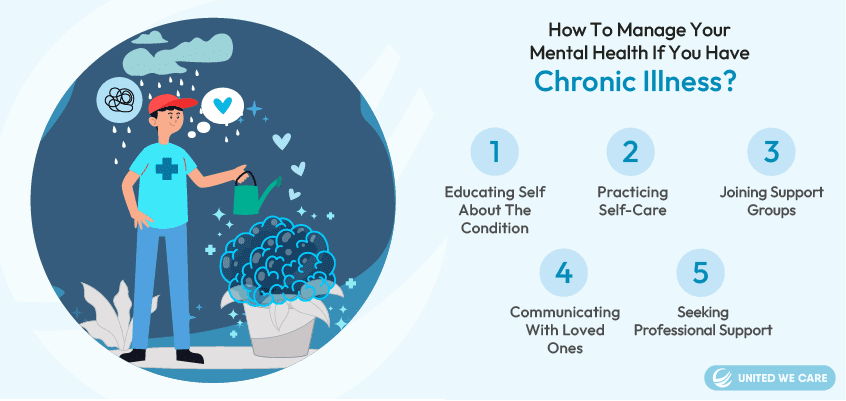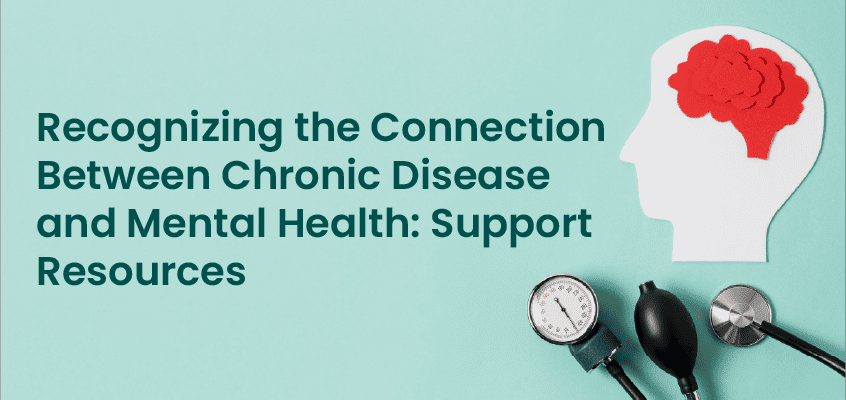Introduction
Dealing with a chronic illness can be difficult due to physical pain, fatigue, and frequent medical appointments that are present in living with it. It is thus important to acknowledge the significant impact of chronic illnesses on an individual’s mental well-being. It is essential to comprehend that physical and mental health are interrelated to offer holistic care. This article will delve into describing the effect of chronic illness on mental health and how one can manage this.
What is a Chronic Disease?
Chronic illnesses are those diseases that are long-term in nature, have slow progression, and require ongoing management and treatment [1]. Unlike acute illnesses that may resolve relatively quickly, chronic illnesses are persistent and often have no known cure. They can affect various aspects of a person’s life, including physical, emotional, and social well-being.
Numerous chronic illnesses affect millions of people worldwide [2]. Of these, WHO recognizes the four most prominent types. These include [1]:

- Cardiovascular Diseases: Health issues that affect the heart and blood vessels, specifically heart attacks and strokes.
- Cancer: Abnormal cellular growth resulting in the development of tumors, affecting different areas of the body.
- Chronic Respiratory Diseases: Persistent respiratory conditions like chronic obstructive pulmonary disease (COPD) and asthma lead to breathing challenges.
- Diabetes: A condition where the body has trouble regulating blood sugar levels due to insufficient insulin production or utilization.
According to some estimates, more than 60% of all annual deaths are attributed to chronic diseases, making them the primary cause of mortality worldwide [1]. These diseases also have a significant economic impact on societies. Further, living with chronic conditions can have a significant negative effect on a person’s overall life.
Read more – hereditary mental illness
What are the Effects of Chronic Disease on Mental Health?
A chronic illness can significantly affect a person’s mental well-being and overall quality of life. After obtaining a chronic illness diagnosis, people often find themselves adjusting their aspirations, lifestyle, and employment. This process usually involves a period of grieving, but the limitations imposed by their condition and concerns about treatment or the future may lead to chronic feelings of stress [3] [4].
Several studies have shown the harmful effects of chronic illness on mental well-being. Some common impacts include:

- Depression and Anxiety: People with chronic illnesses are likelier to experience depression and anxiety disorders. The constant physical symptoms, limitations, and disruptions to daily life can lead to feelings of sadness, hopelessness, and worry [3] [4] [5] [6].
- Decreased Quality of Life: Chronic illness can significantly impact an individual’s overall quality of life. The symptoms and limitations imposed by the condition can interfere with daily activities, social interactions, and personal relationships. Experiencing this can make a person feel isolated, frustrated, and less satisfied with their life. [7].
- Chronic Stress: Chronic illness’s ongoing management and uncertainty can create chronic stress. Medical appointments, treatments, and lifestyle adjustments can be overwhelming and exhausting. This prolonged stress can negatively affect mental health and contribute to developing or exacerbating anxiety and depressive symptoms [6] [7].
- Issues in Social and Professional Life: Chronic illness can sometimes lead to social and emotional isolation. Individuals may face difficulties participating in social activities or maintaining relationships due to physical limitations or fear of judgment. They may also find it challenging to preserve jobs or cope with the demands of their employment with their illness. This can further contribute to loneliness, low self-esteem, and a sense of being misunderstood [4] [6].
- Increased Risk of Suicidal Ideation: The chances of experiencing suicidal thoughts and behaviors are also high in individuals with chronic illnesses. Hopelessness and despair can result from living with a chronic disease due to its psychological impact, challenges, and limitations [5].
Understanding the emotional aspect of chronic illness is imperative when working with people with such a diagnosis. Clinicians should also make the person aware of such risks and discuss positive coping strategies.
More information about illness anxiety disorder
How to Manage Your Mental Health if you have Chronic Disease?

Managing mental health while living with a chronic illness is crucial for overall well-being and quality of life. Here are five essential tips a person with chronic illness can follow to navigate this journey effectively [8] [9]:
- Educating Self About the Condition: Learning about the correlation between chronic illnesses and mental health is essential. When one is aware of how their condition can impact their emotions and mental well-being, they will be more likely to manage it effectively.
- Practicing Self-Care: Prioritize self-care activities that promote relaxation, stress reduction, and emotional well-being. This may include engaging in hobbies, practicing mindfulness or meditation, maintaining a balanced diet, exercising regularly, and seeking social support.
- Joining Support Groups: Connecting with others facing similar challenges by joining support groups specifically tailored for individuals with chronic illnesses can be crucial for better management. Sharing experiences, advice, and support with those who understand firsthand can provide a sense of belonging and alleviate feelings of isolation.
- Communicating with Loved Ones: Openly sharing with loved ones about one’s struggles and needs can help gain more support. Not everyone naturally comprehends chronic illness and its effects. Expressing your worries can aid in your comprehension of the condition and the assistance you may need.
- Seeking Professional Support: Psychologists, therapists, or counselors trained in health psychology can provide valuable support in managing the emotional aspects of chronic illness. With the help of a professional, one can identify the exact needs and develop a personalized plan for better management of chronic illness.
It is crucial to remember that managing mental health with a chronic illness is an ongoing process, and one needs to be patient and compassionate in this journey. Fostering a positive mindset by engaging in things that provide meaning, finding gratitude in small victories, and celebrating progress can help lead a better life.
Conclusion
Recognizing the connection between chronic illness and mental health is vital for providing comprehensive care to individuals facing these challenges. Chronic illnesses can significantly impact an individual’s mental well-being, leading to various emotional struggles. However, by understanding this connection, healthcare providers can offer psychoeducation, support groups, and individual therapy and encourage self-care practices to help individuals navigate the emotional aspects of their conditions.
If you are experiencing negative mental health due to your chronic illness, contact the experts in United We Care. Our platform has a range of highly equipped experts to provide guidance and support for your concerns. At United We Care, our team strives to provide the best solutions for your overall well-being.
References
- A. Grover and A. Joshi, “An overview of chronic disease models: A Systematic Literature Review,” Global Journal of Health Science, vol. 7, no. 2, 2014. doi:10.5539/gjhs.v7n2p210
- “Chronic disease list: Conditions covered,” Momentum, https://www.momentum.co.za/momentum/personal/products/medical-aid/chronic-conditions-covered (accessed Jun. 29, 2023).
- “Chronic illness and mental health: Recognizing and treating depression,” National Institute of Mental Health, https://www.nimh.nih.gov/health/publications/chronic-illness-mental-health (accessed Jun. 29, 2023).
- J. Turner and B. Kelly, “Emotional dimensions of chronic disease,” Western Journal of Medicine, vol. 172, no. 2, pp. 124–128, 2000. doi:10.1136/ewjm.172.2.124
- N. Gürhan, N. G. Beşer, Ü. Polat, and M. Koç, “Suicide risk and depression in individuals with chronic illness,” Community Mental Health Journal, vol. 55, no. 5, pp. 840–848, 2019. doi:10.1007/s10597-019-00388-7
- P. F. M. Verhaak, M. J. W. M. Heijmans, L. Peters, and M. Rijken, “Chronic disease and mental disorder,” Social Science & Medicine, vol. 60, no. 4, pp. 789–797, 2005. doi:10.1016/j.socscimed.2004.06.012
- K. Megari, “Quality of life in chronic disease patients,” Health Psychology Research, vol. 1, no. 3, p. 27, 2013. doi:10.4081/hpr.2013.e27
- R. Madell, “Coping with the stress of living with chronic illness,” Healthline, https://www.healthline.com/health/depression/chronic-illness (accessed Jun. 29, 2023).
M. Pomlett, “Managing mental health with a chronic illness,” Psychological Health Care, https://www.psychologicalhealthcare.com.au/blog/chronic-illness-mental-health/ (accessed Jun. 29, 2023).









